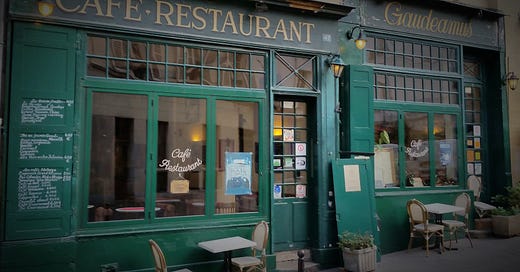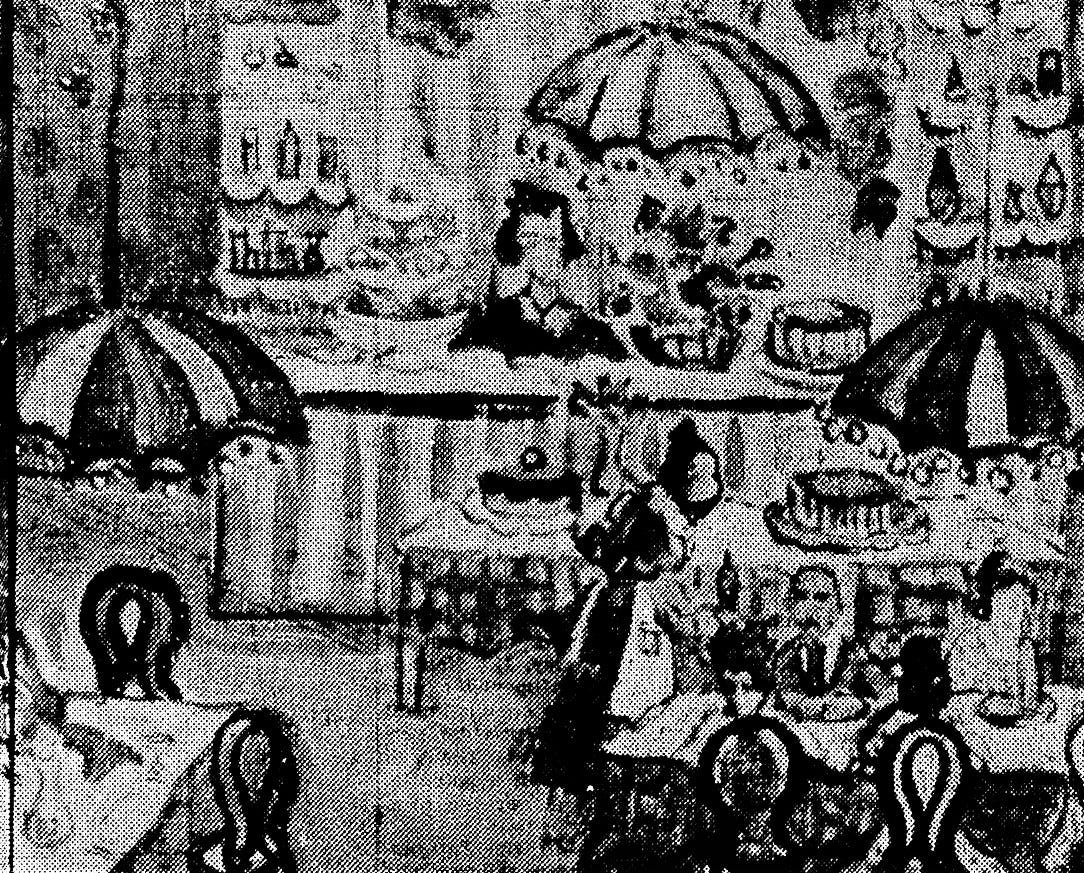Song of the Amorous Frogs – Part 13
A Story of Paris in the 1920s
(Bidding Adieu to the Amorous Frogs! Yes, this is the last installment - though there may be a 10-years-later sequel sometime - who knows? But for now, the Frogs are about to fall silent. Catch up on their earlier Amorous adventures here: Song of the Amorous Frogs.)
XXIV
“Come with me on my journey to Morocco and Tunisia. Clemmie Tan is off to Russia, and I must leave Paris for the cold months. It will be so exciting to write “Africa” at the top of our letters. And then we can pass the winter months, when Paris is damp and gloomy, in Sicily or Malta or some other warm place,” Mrs. Cherry said, one day at the beginning of December, when she found me sad. “Warmth, when Paris is cold, will lift our spirits, don’t you think?”
And since I now had no reason to stay in Paris – had painful reasons, in fact, to be away – I did go with her on her journey. And on some days her sage company, and her laughter, and the amazing sights we saw did lift my spirits, and helped me smile. (On some days not.)
We made a circuit through Spain, to see the glories of art at the Prado, in Madrid. Mrs. Cherry spent hours a day there, taking notes, “For lectures when I get home,” she said, but even more, of course, for the soul-nourishment that great art gives, especially to true artists. And to Toledo: “I’ve longed for decades to see El Greco.”
Together, we stood in muffled awe beneath the rose and white arches in the Great Mosque in Cordoba; strolled the paradisical gardens and Mudejar chambers of the Alhambra; felt our insignificance, the insignificance of all humanity, except by the power of God, embodied in the gigantic universe of the Cathedral of Seville (which human beings had made!).
And then we crossed from Gibraltar to Morocco, and into a different world, where the sights and smells were different, the costumes different, the ways and expectations were different from anything either of us had known before.
“We don’t always understand or agree,” Mrs. Cherry observed, as we discussed the attitude of our guide towards his beautiful, young, unmarried sister. “But they are their ways, so we must accept them while we’re here.”
We chose Majorca for the winter months – picking the town, as it happened, where Chopin had wintered with George Sand, the bold French woman who wrote her novels, and lived her life, as George – who knew that a man-name would smooth her way in the man-world of her day. I wondered if Chopin might have composed the Largo there, the one my Cellist had played for me that evening so long ago in the Arènes de Lutèce? I decided that he had, and I cherished that gift of love the more dearly thinking it.
We went to Palma, to the cathedral, and I glanced over her shoulder as she wrote a letter to her good artist friend, Dawson Dawson-Watson, Englishman, met in Giverny, now painting in San Antonio: “How wonderful to be standing in Palma Cathedral, reading Cram’s description of it!” (Boston architect, Ralph Adams Cram, designer of Rice Institute, whose study of Palma inspired the new Public Library in Houston, also his design.)
In Valldemossa, while she painted lush paintings of the mountain roads and ancient villages, even I sketched, at her urging, consummate teacher that she was, though I had long since given up art for writing.
The months passed pleasantly, and my sadness passed with them – except for times when it flooded back at unexpected moments, sparked by sights or sounds or recollections that seemed unrelated, but somehow were. Even such moments faded quickly and became less frequent.
And then it was time to go back to Paris. I had kept my garden room with the Madame, just as Mrs. Cherry had kept her room at the Dagmar, and so, once back in Paris, after months together almost every waking hour of every day, we saw each other less – sometimes not even once a week. She resumed her study with Lhote and her gallery going: “I want to get in as much as I can before it’s time to go home,” she said. “Who knows if I will ever be here again.”
It was splendid spring by the time we returned, so I passed my days walking, as one sometimes does in Paris, when one is alone and remembering, revisiting the places I had come to love over the years, by now, that I had made my life in the City. Walking in places where I had walked with Clem and then with my Cellist. I walked in the Luxembourg, watching the little boys sailing their boats, and the men playing pétanque, as I had done in past times. I walked in the Jardin des Plantes, and heard the frogs: It was their season again, la saison de l’amour – even for those of us who did not have love just then. I even went to the arena, and heard the music of past days in my memory.
One evening I decided I had the strength to return to Café Gaudeamus. I climbed the steep street, from the quai on the Seine, where I had been walking, looking at the spires and windows and gargoyles of Notre-Dame in the soft evening light. All the way up almost to the summit of Montagne Sainte-Geneviève, past the bal musette, past the little square where rue de la Montagne Sainte-Geneviève goes off to the right, toward Eglise Saint-Etienne-du-Mont and the Pantheon.
It had been long enough, and I had moved on and mended enough (I hoped), to go there without finding it painful. Only slightly melancholy, perhaps, but that feeling can be pleasant as well as painful, if enough time has passed. I would sit at the same table where my Cellist and I had had that first repartee; I’d remember his clever line, about cat and mouse, and smile, even through a little pain. It was a clever line, though a truer one than I knew the night I (“poor mouse”) heard him say it.
I stopped across the street from Gaudeamus, so that I could see the green façade, shiny with new paint for the new season ahead, and look through the windows into the cheerful, bright room. I hoped that “our” table would not be filled already, though at that hour on a fine night, there was every chance it would be.
And indeed it was. After a small pang of disappointment, I felt the much sharper thrust of shock and hurt that came as I saw that those who filled the table were Clem and my Cellist! How could that be possible – that they were there on this night, of all nights, when I looked through the window for the first time in months? Such things happen only in sentimental novels and romantic films (those in which the romance has foundered). And yet there they were, the two of them together. And a third chair, empty except for my Cellist’s instrument resting on it, as though reserved for me to join them. I drew a sharp breath at the very thought, and felt a panic that almost had me running back down, or up, the street, whichever direction would take me away fastest.
But I didn’t run away. I knew that would be foolish. I couldn’t run away from the feelings, even if I could run away from the place, so what point in running away at all? I got hold of myself and stayed in my spot on the sidewalk, watching through the Gaudeamus window as my memories of them both came flooding back.
As I watched these two men whose love had once been, one after the other, the center of my world, the essential manna of my being, and now was mine no longer, the phrase, “unlucky in love” came into my mind.
But was it unlucky, really, just because love did not last? Neither do beautiful flowers, and yet we still cultivate them, arrange them into magnificent bouquets, bask in their loveliness until they fade – and then discard them when they do, with a little melancholy, perhaps, but not regret – and then remember their beauty, longing for their like again.
As I stood on the darkened sidewalk, I looked at them in the lighted room, sitting at their table, talking, gesturing, laughing. Clem reached out and touched my Cellist’s cheek, in full view of the crowded room – a caress I could not have imagined him making in those long-ago days when we were first together in Paris, but a gesture which looked so easy for him now. My Cellist looked back at him the way he had once, in not quite so long-ago days, looked at me.
Yes, I was envious – of them both. Yes, I thought for an instant how sad that I was not one of the two at the table now.
But I felt no jealousy. The time for jealousy had passed. I felt no hatred either, for these two men for whom I had felt so much love once. A tear came to my eye, and an ache to my heart, but not regret. What they had now, we had had once. And I longed to have it once again, someday, with someone else.
I would not go in. That would do no good, for me, certainly, nor for them. I walked on up the street to Saint-Étienne-du-Mont, which had meant so much to all of us, not as a place of religion, but as a symbol of all the ancient serenity, comfort, beauty that was Paris. I went through the door into the empty sanctuary. I remembered the times Clem and I had come there together; the evening when I had first heard my Cellist playing there. All the many times we had been there over the years, as ones or twos. And more tears came, not tears of sadness, but of that feeling for which there is no single name, that understands that all things are joy and sadness and remembrance and loss and transience – all things, feelings, people, life even. That thing that Paris had taught me was the real essence, and that I could not have learned, perhaps, not to the same degree, any other place.
As I sat there, looking for the hundredth time at the magnificent, rare rood screen – relic from another time, still making our time glorious – I knew that the time had come for me to go home. Many Parisians of a certain age have a harried look, as though the hounds of life have been chasing them. I could imagine that look in my own face if I stayed long in Paris - especially alone.
It was time to go home. Or, if that proved impossible, then to New York, or west, to San Francisco, perhaps. To test the truth of something I had heard Ernest say, one splendid evening at La Rotonde, when we all were in best glittering form – a thrown-off brilliant observation, for those who had found life, and found themselves in this City of Light and life. Home, to find out if it is true that: “Paris is a moveable feast,” as he had said. I had feasted, even though not all the dishes had been delightful. Now it was time for me to see if the sustenance Paris gave would see me through the life that lay ahead.
THE END - at least for now.






mA great return to Paris, and room for hope we'll meet again, if not in Paris . . .